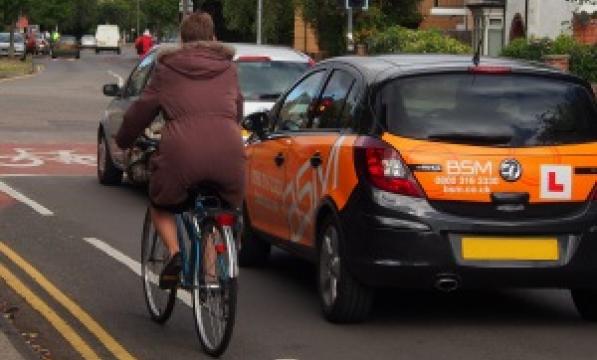The AA and BSM launch cycle awareness module for all driving instructors

The driver awareness module would teach driving instructors about cyclists' needs, and also overturn some myths about cyclists' right to use the roads.
The AA and British School of Motoring (BSM) announcement is in large part thanks to the President of the AA, Edmund King's personal backing of a more conciliatory culture of road use between cyclists and motorists.
The AA has also encouraged its members to sign up to the e-petition to implement the Get Britain Cycling report. Edmund King gave evidence to the inquiry alongside CTC and other road safety campaigning groups, urging greater uptake of high quality cycle training and suggested that those who had had training may make better, safer drivers - a view which CTC shares.
I am personally committed to breaking down the ‘Two Tribes’ attitude displayed between some drivers and cyclists. Often we are the same people. I am delighted to announce that two of the biggest driving schools, AA and BSM, will be working to bring harmony on the roads between drivers and cyclists."
Edmund King
AA President
In the past the AA has pointed out that almost one in five of its members regularly ride a bike, while CTC's own evidence suggests that 82% of CTC's members have a driver's licence: a higher proportion than in the wider adult population. This same point was made by the Department for Transport in a small-scale road safety advert carried out last year.
Mark Peacock, head of BSM, said: “Successfully teaching a learner to drive safely around cyclists means instilling a good attitude, as well as the necessary practical driving skills.
“It can be intimidating and confusing for learners the first few times they come across a cyclist. Understanding why cyclists behave in certain ways, such as avoiding potholes or how they are affected in strong winds, is key to being safe around them."
CTC's Campaigns & Policy Director Roger Geffen said: "This is excellent news. Driving instructors have an important contribution to make in teaching drivers, particularly higher-risk younger drivers, about the risks cyclists face from potholes and other design failings of our roads and junctions, and how to show respect and consideration for their safety. It is also crucial to give instructors the knowledge and resources to undermine some of the perennial myths about the right of cyclists to use the roads.
"However, it would be even better if young people were given advanced cycle training on the use of busier roads, before they start learning to drive. Anecdotal evidence from instructors suggests that regular cyclists are quicker to pick up hazard perception and defensive driving skills. CTC has previously argued that advanced cycle training for teenagers be provided alongside basic skills training for younger children as part of the school curriculum."
The commitment from AA and BSM (the two organisations are owned by the same company) is a very positive move, particularly if it helps reduce some of the prejudice and antagonistic behaviour shown towards cyclists by a small minority of road users. The two driving schools employ several thousand driving instructors in total. However, there are thousands of other driving instructors in the country, all of whom could also be taught this module if the Driving Standards Agency decided to make it a priority.

